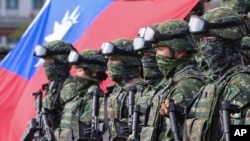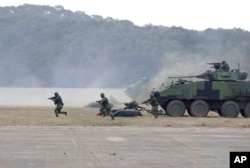Taiwan's military has announced new recruitment and retention measures to help sustain troop levels, as the island faces continued threats from China amid a shrinking number of volunteer soldiers.
According to Taiwan’s Central News Agency, the Ministry of National Defense unveiled measures Wednesday that call for pay raises for volunteer enlistees among other incentives.
According to data from the Budget Center of Taiwan’s Legislative Yuan, the number of volunteer troops has dropped by 12,000 over the past three years. The military currently has 152,885 soldiers, compared with 164,884 soldiers in 2021.
Additionally, more Taiwanese soldiers are choosing to discharge from their service commitments early, according to the data. Some 1,565 troops took early leave in 2024, a sharp increase from the nearly 400 personnel who did so in 2020.
The decline has prompted Taiwanese authorities to reinstate a one-year conscripted service requirement for Taiwanese males and make efforts to improve the military’s defense training infrastructure and provide higher salaries to its troops.
Still, some analysts are worried that these reforms might not be enough to ensure Taiwan’s combat-readiness.
Yu-Ping Chou is a former director of the planning division at the Air Defense Missile Command under the General Staff Headquarters of Taiwan's Ministry of National Defense. He told VOA’s Mandarin Service that so far reforms have not been enough to ease the challenges of troop recruitment and retention.
Current active-duty personnel find themselves taking on extended hours of training and service work to offset the impact of depleted troop enrollment, which drives more troops to seek discharge, Chou said.
More frequent aggressive maneuvers from China have also required Taiwan’s military to increase surveillance and patrol missions, adding to the burden put on already overworked soldiers, he said.
Chou said the military is also facing a type of “brain-drain.” This problem is particularly prominent within the air force, with many skilled pilots deciding to leave and seek higher salaries in the commercial airline industry.
Experienced soldiers are essential to operate advanced weapons systems, which makes the heightened discharge numbers especially challenging for the island’s efforts to modernize its defense force.
“The defense force is currently in the process of upgrading its equipment and weapons systems, and needs quality manpower to operate these new, advanced weapons,” Chou said. “If there’s no one to operate the best equipment, can it perform at its full potential?”
A final reason for the fall in enrollment, Chou said, stems from the perceived heightened danger of serving as a soldier at this time. He said the current “danger of war” has made some families reluctant to send their children into service.
A-Wei, a 32-year-old volunteer officer who has served for 11 years in Matsu, an island off the southeastern coast of mainland China, says he has never considered early retirement.
While Wei admits that many units are troubled with a salary mismatch and understaffing, with some even operating with 50% or 60% of the desired manpower, he says that the capacity of Taiwan’s fighting forces has not faltered.
For Wei, these present challenges have, on the contrary, pushed the military to become more efficient.
He asserts that, despite issues with the military budget and troop recruitment, the capacity of Taiwan’s military has not faltered, and that troops remain steadfast despite the looming threat of war.
“Many of the military's current equipment is actually very advanced. I don't think the decrease in personnel has a big impact. In the past, there were actually some surplus personnel. Now, the training has become much more enhanced and streamlined, eliminating some unnecessary procedures,” Wei told VOA.
Upgrades in equipment and a stable, good-enough salary have kept Wei at his position in the military. Wei says that with his salary and bonuses for participating in combat-related missions, he is earning more than some office workers on the island.
As for talk online and in the media about whether Taiwanese soldiers are willing or afraid to go to war, Wei said that this is likely a Chinese "information warfare" tactic.
“The most common reason people leave the military, or why a unit may struggle to keep personnel, is because they feel the task distribution is unfair or the workload is too heavy,” Wei said. “I've never heard of anyone wanting to leave the military just because they think mainland China is going to attack.”
Su Tzu-yun, director of the division of defense strategy and resource under the Institute for National Defense and Security Research in Taipei, blamed demographic factors for the fall in recruitment, and pointed out that many advanced democracies are also facing challenges in military recruitment.
The number of men eligible for military recruitment is falling, dropping below 100,000 in 2024 for the first time in Taiwan’s history, according to the Ministry of the Interior. By 2031, it is predicted that there will be fewer than 75,000 recruitable men on the island.
Taiwan is looking to meet this challenge with its reinstatement of one-year compulsory service requirement, Su said, adding that he has faith in the program’s ability to increase manpower and ease the burden on volunteer troops.
“I think that during this transition period, with the addition of conscription soldiers, around 6,900 people, for example, joined the military last year, and more will join this year. After supplementing the manpower, the workload of the voluntary service members will be reduced, which will help decrease their overall discharge rate, thus avoiding this vicious cycle,” Su told VOA.
Aside from lengthening the conscription requirement and improving salaries and benefits, Taiwan’s Defense Ministry is looking at a variety of other measures to combat the recruitment and retention problem.
These programs include adopting more tolerant management practices within the service and liberalizing entry restrictions to recruit foreign personnel.
VOA's Katherine Michaelson contributed to this report.





